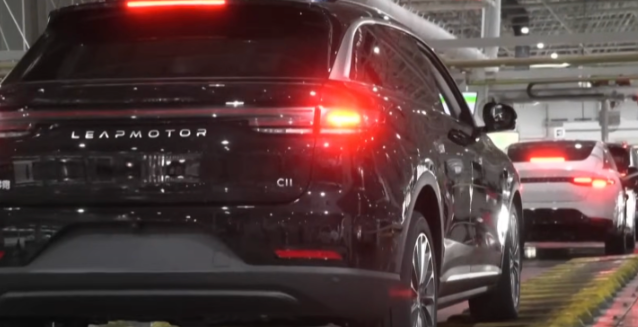News
White House Proposes Ban on Chinese Vehicles, Technology for National Security Reasons

Source: YouTube
The Biden administration is ramping up efforts to protect U.S. national security by proposing a ban on Chinese vehicles from American roads. This move, part of a broader regulatory crackdown, also includes a requirement for U.S. automakers to remove Chinese software from their cars, targeting both the physical and digital components of vehicles with Chinese connections. The ban further restricts Chinese self-driving cars from being tested on U.S. soil, amplifying the administration's concern over the potential security threats posed by Chinese technology.
Addressing National Security Concerns
The core of the proposed regulation, led by the U.S. Commerce Department, aims to prevent the collection and manipulation of sensitive data by Chinese companies. Connected vehicles, which feature internet access for navigation, safety systems, and entertainment, offer opportunities for data collection. The Biden White House has raised concerns about Chinese manufacturers gaining access to information about American drivers and infrastructure through these connected cars.
Commerce Secretary Gina Raimondo explained that Chinese-made software in vehicles could open the door to surveillance and remote control, putting U.S. drivers at risk. “In an extreme situation, a foreign adversary could shut down or take control of all their vehicles operating in the United States at the same time, causing crashes or blocking roads,” she noted.
Chinese Vehicles, EVs, and Current Tariffs
Chinese electric vehicles (EVs) have faced increasing obstacles in the U.S. market, with the Biden administration enforcing steep tariffs on Chinese imports earlier this month. A 100% tariff on Chinese EVs, along with new hikes on EV batteries and key minerals, has already made it difficult for Chinese manufacturers to compete. These tariffs are part of the administration's broader effort to restrict China’s growing presence in critical industries.
The proposed Chinese vehicles ban would also apply to Chinese-made hardware starting with the 2029 model year, while prohibitions on software would begin as early as 2027. The White House plans to finalize these rules by January 2025, giving automakers some time to transition their supply chains away from Chinese suppliers.
Fears of Data Breaches and Infrastructure Vulnerabilities
The primary motivation behind this ban is the fear that Chinese companies, through their vehicles and software, could gain access to valuable data on U.S. drivers and infrastructure. Connected vehicles collect a vast amount of information—ranging from driving habits to location data—that could be exploited if in the wrong hands. National Security Adviser Jake Sullivan has emphasized the risks of foreign adversaries like China potentially embedding malware in U.S. infrastructure, including vehicles.
The potential to manipulate these Chinese vehicles remotely poses another serious concern. Whether by accessing onboard navigation systems or using the software to control various car functions, Chinese automakers could hypothetically launch cyberattacks targeting American roads and traffic networks. These fears are not unfounded, as the White House's investigation into these risks began in February.
Political and Economic Repercussions
While the ban's intent is clear, its implementation could have significant political and economic consequences. The U.S. has a delicate relationship with China, and this move would likely escalate tensions between the two global superpowers. China has already expressed its disapproval, accusing the U.S. of unfairly targeting Chinese companies under the guise of national security concerns.
The Chinese government responded through its Washington Embassy, urging the U.S. to adhere to market principles and international trade rules. It views the Chinese vehicles ban as a form of protectionism designed to stifle competition rather than address genuine security concerns.
US Automakers In a Dillema Over Chinese Technology in Their Cars
Economically, U.S. automakers are facing the daunting task of restructuring their supply chains to comply with the new rules. The Alliance For Automotive Innovation, which represents major automakers like General Motors, Toyota, and Hyundai, has warned that altering vehicle software and hardware will require time and significant investment. While some companies may manage the transition within the proposed timeline, others could struggle to replace Chinese components quickly enough.
The long-term effects of this ban could reshape the U.S. automotive industry, potentially leading to higher costs for car manufacturers and consumers as companies move away from Chinese suppliers. Additionally, the exclusion of Chinese self-driving cars from American roads may slow innovation in autonomous vehicle technology, an area where Chinese companies are rapidly advancing.
Balancing Security and Trade Relations
The Biden administration's proposed ban represents a significant step in addressing national security threats from foreign adversaries like China. However, it also raises questions about the future of U.S.-China trade relations, particularly in the high-tech and automotive sectors.
While the administration is focused on safeguarding American drivers and infrastructure from potential threats, the economic impact of cutting ties with Chinese suppliers could have far-reaching consequences. The challenge for the U.S. will be finding a balance between ensuring national security and maintaining healthy economic relations with one of its largest trade partners.
Do you agree with the White House’s plan to ban Chinese vehicles and automobile technology from US roads? Tell us what you think.



